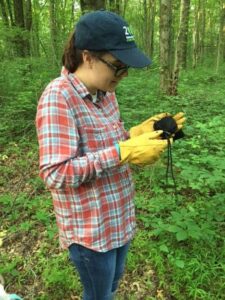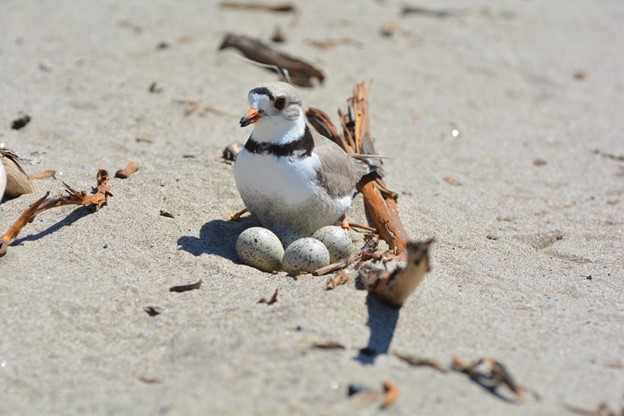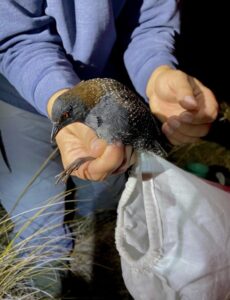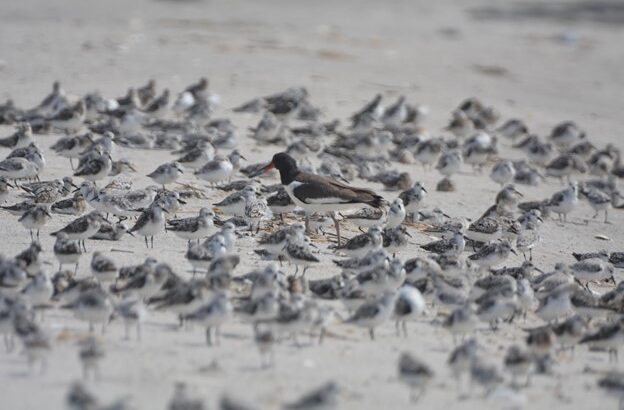Over the next few weeks, Science Borealis is excited to feature a series of stories developed for a story-telling event held at the joint conference of the Society of Canadian Ornithologists, Association of Field Ornithology, and Wilson Ornithological Society in July 2024. These stories were prepared with the help of Borealis Blog editors and polished for oral presentation by coaches from The Story Collider. We hope you enjoy these behind-the-scenes glimpses into the lives of ornithologists!
By Lauren Monopoli
I fell out of love with science when I was 23.
Every accomplishment I had achieved, all the time spent in classes and labs, and the many research projects I worked on all felt pointless. I would have switched careers and never worked in conservation again, if it were not for birds.

The author handling a white-footed mouse captured in 2017 as part of a long-term scientific research project on the population dynamics of small mammals in New Jersey. All the animals were weighed, sexed, and tagged and then released unharmed. Image: Dr. Tammy Windfelder, used with permission.
Planning my future
I knew early into my undergraduate career that I wanted to do a PhD. I wanted to have an active role in research projects. But it was not ornithology that interested me. At the time, I was adamant that I would never study birds. Instead, I wanted to pursue a career in forest ecology. I actively worked in restoration and later studied small mammal movements and habitat use.
Soon after I completed my undergraduate degree, I started working as a field technician on a series of projects exploring the effects of fire in hardwood forests. I was excited to begin this next chapter of my life. But what I thought would be an important stepping stone in my career as a forest ecologist was really a wedge between me, my mental health, and my career goals.
My brain is not like your brain
I have always struggled at school. At seven years old, I was far behind most of my classmates in terms of reading comprehension, spelling, and math. I also struggled with exams, often not completing them due to severe panic attacks. My mom, recognizing that something was wrong, became my fiercest advocate. Following a lengthy argument with the principal of my elementary school, my mom succeeded in having me held back and I repeated the first grade. Several years later, I was formally diagnosed with generalized anxiety disorder and attention-deficit hyperactivity disorder (ADHD). Finally, I had an explanation for my struggles.
An ADHD diagnosis indicates more than concentration issues or an inability to sit still. Many of us struggle with emotional dysregulation—having stronger than average emotional reactions to stimuli—which can result in rejection sensitivity, depression, anxiety, and low self-esteem. Some have more learning disabilities that complicate their lives. For me, these include slow processing disorder, auditory processing disorder, and poor working memory. Essentially, my brain takes slightly longer to process and understand information, be it written or auditory, which makes it more difficult for me to remember new information. An assignment that should take about an hour to complete may take me a day or more.
There are many stigmas associated with ADHD. Countless people have told me: “You are lying about your diagnosis”; “Your parents didn’t discipline you enough as a child”; or that “You are simply too smart to have ADHD” (the last one from a professor during my masters). These interactions made me feel uncomfortable mentioning my ADHD, fearful of how a person may react. And my childhood neurologist had stressed to me that under the Health Insurance Portability and Accountability Act, I do not have to disclose this information and I am legally protected from doing so.
My professional life unravels
I started my new job without formally meeting my supervisor. Though I did not think much of this at the time, a lack of availability would become a major issue. It was during my first field excursion with coworkers that I overheard a series of stories about my supervisor that outlined instances of bullying and unprofessional behavior. “Grin and bear it” was the motto. Only a few days into my job, I was beginning to fear that I had made a big mistake.
I soon learned firsthand how fast my supervisor’s attitude could change. I often had no idea what was expected, and my questions were met with frustration. It felt like I was expected to be one step ahead of my supervisor all the time. On good days, my supervisor would respond to questions with vague answers; my personal favorite was “Follow your gut.” I became increasingly depressed and felt isolated from my coworkers. Eventually, I decided to quit a job I thought I would love.
The final meeting with my supervisor was harrowing. I thought it would be a simple discussion about the field season. Instead, I was ridiculed and belittled for well over an hour. Every aspect of my identity was nitpicked, such as my need to ask questions, and I was mocked for a panic attack he had witnessed. Trying to defend myself, I explained my ADHD and anxiety. This opened a whole new can-of-worms. I was shouted at for never saying anything, that this was something he needed to know and should have been aware of. In the end, I was told that I had no place in ecology, that I should seek help from a mental health facility, and that I would never earn a PhD. “You can’t be trusted,” he said, “because you lack scientific integrity.”
My personal life was also off track
At this time, I was also struggling with an important personal issue. For years, I had suppressed my sexuality and never allowed myself to think I was anything other than straight. While my family is open and supportive, I struggled to reconcile the person I was with the person I thought I should be. So, I avoided all thoughts about my sexuality for almost 10 years. But there is an unavoidable weight that comes with denying your identity for so long. It is painful and, over time, becomes exhausting.
I started to make some progress as I completed my undergraduate degree at a big city university, but it ground to a halt soon after moving to a small community for my job. The local attitudes on queer people were not entirely favorable. It took a lawsuit and a Town Hall meeting for public officials to allow Pride events to take place. To make matters worse, I had very few people I could talk to. The one person I did come out as queer responded with silence. I was trapped in identity limbo.
Time to regroup and rethink
When I moved back home to New York City, I felt empty. I have always loved conservation and been a strong environmental advocate. I remember insisting that my family start recycling after learning about it in 3rd grade. But after working in such an antagonistic environment, a career in conversation did not seem possible. I had no idea who or what I wanted to be.
While I turned to queer fiction to start healing a part of myself I had long neglected, I started to think about what kind of career I wanted. There was no question I would continue in ecology, but the exact path changed daily. Did I want to do environmental law? Could I work as a consultant or even a zoo educator? But no matter what career paths I explored online, I still felt drawn to research-based positions. Any love I had for forest conservation was gone. My recent work experience left me terrified of academia. I knew I needed something different.
A brand-new start
Then I saw a job posting for a shorebird technician for the NYC Parks and Recreation Department. The work focused on monitoring the federally protected Piping Plover, a sparrow-sized bird that builds its nest directly on the beach. Other birds in the observation area included the Black Skimmer, Common Tern, and American Oystercatcher. I did not really know anything about birds, had no idea ground nesting was a thing, and had promised myself that I would never study or work with birds. But you know, desperate times and all that. I applied for the position on a whim and was hired. I never expected that this experience would change the trajectory of my life.

An adult Piping Plover sitting in its nest. Piping Plover nests, called scrapes, are built by the males who scratch or dig several small depressions into the ground. Female Piping Plovers will then pick one of these scrapes to lay her eggs. Image: USGS, Public Domain.
I have always equated finding one’s place in ecology to a puzzle: Once you find that missing piece, everything falls into place. I still remember the moment it all came together for me. I was army-crawling across hot sand to read the band on a Piping Plover. Where most people would not have been very thrilled, I was ecstatic. It was the happiest I had been in months. And, for the first time in years, I was actually enjoying my work. Within a few months, I knew I wanted to do this for a living. Okay, maybe not crawling across the sand, but I knew I wanted a career based in avian conservation. This idea crystallized into a more specific goal as I progressed through my master’s work: managing threatened coastal birds.
A new path forward

The Eastern Black Rail is a small, well-camouflaged, marsh bird with a patchily distributed along the Atlantic and Gulf coasts. The species numbers have declined by over 75% and it was recently listed as threatened under the Endangered Species Act. Image: Lauren F. Monopoli, used by permission.
All these experiences, both good and bad, have led to my current position as a PhD student studying the federally threatened Eastern Black Rail. While I did not know much about this secretive marsh bird at the start, I have come to greatly admire this quirky bird. From its unique call, known as the ‘kee-kee-do’, to its little red eyes, the Eastern Black Rail is an utterly endearing bird that I hope to continue studying and protecting for years to come.
Through ornithology, I have found a community of people that genuinely want me to succeed and advance in the field. For the first time, I have a group of queer friends and fellow researchers that have become an integral part of my experience as a graduate student. It is because of them that I found the confidence to come out as a lesbian, ultimately healing a part of myself that has long been damaged. They were also an invaluable lifeline when I found myself working in a situation where I did not feel safe or comfortable discussing my sexuality.
My advisors are also an integral part of my graduate experience. Though I knew I did not have to say anything about my ADHD and anxiety, my earlier work experience made me feel that I should. Their response was a welcome relief. They immediately asked me what they could do to help me and have continuously supported me.
No one in my professional life had ever been so willing to accommodate my ADHD and anxiety.
I never meant to fall in love with birds. They never captivated me as a child, and I was certain that I would never study them. But life is not a straight path. Instead, it is full of sharp curves and bumpy roads. It has been a long and arduous journey from where I was to where I am. But despite everything, I would not change a thing.
Feature image: A juvenile American Oystercatcher surrounded by smaller shorebirds on a New York beach in 2019. Image: Lauren F. Monopoli, used with permission.





hjpeax
s3flol
61279v